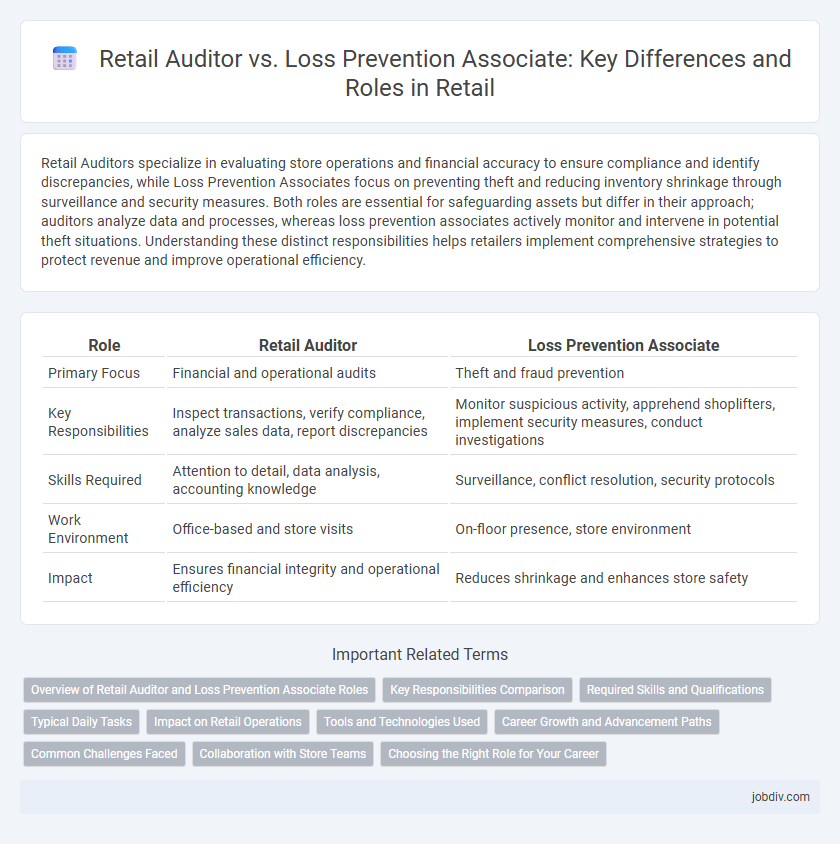Retail Auditors specialize in evaluating store operations and financial accuracy to ensure compliance and identify discrepancies, while Loss Prevention Associates focus on preventing theft and reducing inventory shrinkage through surveillance and security measures. Both roles are essential for safeguarding assets but differ in their approach; auditors analyze data and processes, whereas loss prevention associates actively monitor and intervene in potential theft situations. Understanding these distinct responsibilities helps retailers implement comprehensive strategies to protect revenue and improve operational efficiency.
Table of Comparison
| Role | Retail Auditor | Loss Prevention Associate |
|---|---|---|
| Primary Focus | Financial and operational audits | Theft and fraud prevention |
| Key Responsibilities | Inspect transactions, verify compliance, analyze sales data, report discrepancies | Monitor suspicious activity, apprehend shoplifters, implement security measures, conduct investigations |
| Skills Required | Attention to detail, data analysis, accounting knowledge | Surveillance, conflict resolution, security protocols |
| Work Environment | Office-based and store visits | On-floor presence, store environment |
| Impact | Ensures financial integrity and operational efficiency | Reduces shrinkage and enhances store safety |
Overview of Retail Auditor and Loss Prevention Associate Roles
Retail Auditors conduct thorough inspections and evaluations of store operations, focusing on compliance, inventory accuracy, and financial integrity to minimize discrepancies and improve operational efficiency. Loss Prevention Associates specialize in identifying potential theft risks, monitoring surveillance systems, and implementing strategies to deter shoplifting and internal theft, enhancing store security. Both roles are critical in safeguarding retail assets but concentrate on different aspects: Retail Auditors prioritize procedural accuracy, while Loss Prevention Associates emphasize security and theft reduction.
Key Responsibilities Comparison
Retail Auditors primarily focus on conducting detailed financial audits, inventory reconciliation, and compliance checks to identify discrepancies and improve operational accuracy. Loss Prevention Associates specialize in monitoring store premises, implementing theft deterrence strategies, and responding to security incidents to reduce shrinkage. Both roles contribute to protecting retail assets but differ in their emphasis on financial controls versus physical security measures.
Required Skills and Qualifications
Retail Auditors require strong analytical skills, attention to detail, and proficiency in financial reporting and compliance standards to effectively evaluate store operations and identify discrepancies. Loss Prevention Associates need excellent observational abilities, knowledge of security protocols, and effective communication skills to prevent theft and ensure safety within retail environments. Both roles demand a thorough understanding of retail procedures, but Retail Auditors emphasize data analysis while Loss Prevention Associates focus on physical security measures.
Typical Daily Tasks
Retail Auditors conduct detailed inventory assessments, verify financial records, and ensure compliance with store policies to maintain accurate business operations. Loss Prevention Associates monitor surveillance systems, conduct security patrols, and investigate suspicious activities to prevent theft and reduce shrinkage. Both roles prioritize safeguarding store assets but differ in their approach to operational integrity and security enforcement.
Impact on Retail Operations
Retail Auditors enhance retail operations by conducting detailed financial and compliance audits that detect discrepancies and improve inventory accuracy, reducing shrinkage. Loss Prevention Associates directly impact retail operations by implementing security protocols and surveillance to prevent theft and fraud, safeguarding assets and ensuring a safe shopping environment. Both roles complement each other in minimizing losses and maintaining operational efficiency within retail stores.
Tools and Technologies Used
Retail Auditors primarily utilize advanced data analytics software and inventory management systems to detect discrepancies and ensure compliance with store policies. Loss Prevention Associates rely on surveillance equipment, electronic article surveillance (EAS) tags, and point-of-sale monitoring tools to prevent theft and reduce shrinkage. Both roles increasingly incorporate mobile inspection apps and AI-driven video analytics to enhance real-time asset protection and operational accuracy.
Career Growth and Advancement Paths
Retail Auditors specialize in financial accuracy and compliance, offering clear career advancement into senior auditing roles or corporate finance positions. Loss Prevention Associates focus on security and risk management, paving the way toward leadership roles in asset protection or corporate security management. Both paths provide distinct growth opportunities, with Retail Auditors advancing through analytical and financial expertise, while Loss Prevention Associates develop operational and investigative skills.
Common Challenges Faced
Retail Auditors and Loss Prevention Associates both encounter challenges such as identifying internal theft, managing inventory discrepancies, and ensuring compliance with company policies. They must effectively analyze data to detect suspicious activities while maintaining rapport with staff to encourage cooperation. Time constraints and balancing thorough investigations with daily operational duties also frequently impact their effectiveness.
Collaboration with Store Teams
Retail auditors and loss prevention associates collaborate closely with store teams to enhance operational efficiency and minimize shrinkage. Retail auditors provide detailed assessments of store compliance and financial accuracy, enabling store teams to identify and address vulnerabilities. Loss prevention associates implement security measures and investigate incidents alongside employees, fostering a proactive environment for theft deterrence and asset protection.
Choosing the Right Role for Your Career
Retail Auditors specialize in verifying financial records and inventory accuracy, ensuring compliance with company policies and regulatory standards. Loss Prevention Associates concentrate on minimizing theft and fraud through surveillance, inspections, and employee training, directly protecting store assets. Choosing the right role depends on your skills in analytical auditing versus hands-on security, career goals in finance or asset protection, and interest in operational versus investigative tasks.
Retail Auditor vs Loss Prevention Associate Infographic

 jobdiv.com
jobdiv.com